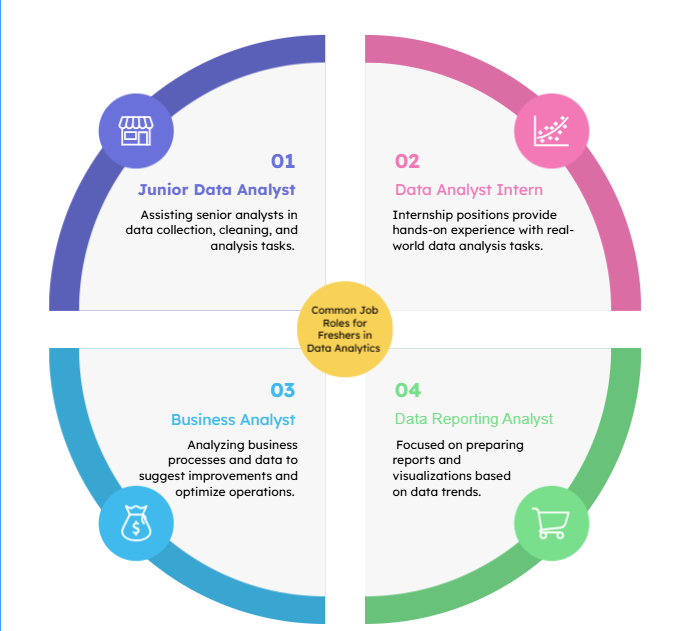Data Analyst Jobs for Freshers: Your Ultimate Guide to Starting a Career in Data Analytics
Sep 23
/
K S
In today's data-driven world, businesses rely heavily on data to make informed decisions, optimize processes, and gain a competitive edge. As a result, the demand for skilled data analysts is at an all-time high. For fresh graduates, this presents a golden opportunity to dive into a high-demand career that promises growth, learning, and a bright future.
In this blog post, we'll explore everything freshers need to know about starting a career in data analysis. From the skills and qualifications required to tips on how to land your first job, this comprehensive guide will equip you with all the information you need to kickstart your journey as a data analyst.
Table of Contents
- What Is a Data Analyst?
- What Does a Data Analyst Do?
- Skills Required for Data Analyst Jobs
- Education and Certifications
- Popular Data Analyst Tools
- Common Job Roles for Freshers in Data Analytics
- How to Build a Data Analyst Portfolio
- Tips for Freshers to Land Their First Data Analyst Job
- Salary Expectations for Fresh Data Analysts
- Interview Preparation Tips
- Conclusion with a CTA
What Is a Data Analyst?
A data analyst is a professional who collects, processes, and analyzes data to help organizations make informed decisions. Their role primarily involves turning raw data into meaningful insights through various tools, techniques, and methodologies. Data analysts are essential in industries ranging from finance and healthcare to retail and technology.
In simpler terms, a data analyst works with data to identify trends, patterns, and insights that can guide business strategies. For freshers, entering the field of data analysis means stepping into a role where your ability to work with data can directly influence business outcomes and provide value.
What Does a Data Analyst Do?
The role of a data analyst can vary depending on the industry and the specific needs of the organization. However, the core responsibilities generally include:
- Data Collection: Gathering data from various sources such as databases, CRM systems, or even external sources like public datasets.
- Data Cleaning: Ensuring that the collected data is accurate, complete, and ready for analysis. This process involves identifying and correcting errors or inconsistencies in the data.
- Data Analysis: Using statistical techniques and tools to interpret the data. Analysts look for patterns, correlations, and trends that can be used to support business decisions.
- Data Visualization: Presenting the analyzed data in a way that is easy to understand. This often involves creating charts, graphs, or dashboards to communicate the insights.
- Reporting: Preparing detailed reports that summarize findings and provide actionable recommendations to stakeholders.
For freshers, learning these core tasks is essential, as they form the foundation of most entry-level data analyst roles.
Skills Required for Data Analyst Jobs
The skills required to become a successful data analyst can be broadly categorized into technical and soft skills:
Technical Skills
Data Manipulation: Familiarity with programming languages like SQL, Python, or R for querying and manipulating data.
Data Visualization: Proficiency in tools like Tableau, Power BI, or Excel to create visual representations of data.
Statistical Analysis: Understanding of basic statistical methods and models to analyze data and extract insights.
Database Management: Knowledge of relational databases and how to manage large datasets efficiently.
Problem-Solving: The ability to approach data with a logical and analytical mindset to solve business problems.
Soft Skills
Communication: Being able to explain complex data insights to non-technical stakeholders in an easily understandable manner.
Attention to Detail: Data analysis requires meticulous attention to detail to ensure data accuracy and meaningful insights.
Critical Thinking: Data analysts must interpret data critically, questioning its reliability and considering multiple perspectives.
Education and Certifications
While many data analysts have a degree in fields such as computer science, mathematics, statistics, or economics, the path to becoming a data analyst can be flexible. Several online certifications and bootcamps provide the necessary skills for freshers to enter the field.
While many data analysts have a degree in fields such as computer science, mathematics, statistics, or economics, the path to becoming a data analyst can be flexible. Several online certifications and bootcamps provide the necessary skills for freshers to enter the field.
Some valuable resources and certifications include:
FreshersUtopia – FreshersUtopia offers a comprehensive platform for aspiring data analysts, providing quizzes, challenges, and resources to help freshers build their technical aptitude in data analysis. The platform focuses on key areas like Python, SQL, and general aptitude, along with offering mock tests and interview preparation materials. FreshersUtopia is designed to equip freshers with the necessary skills to stand out in the competitive job market, making it an essential tool for anyone looking to break into the field of data analysis.
Google Data Analytics Professional Certificate (Coursera) – This certification is one of the most recognized online programs that covers data analytics fundamentals, including hands-on projects with real-world applications.
Microsoft Certified: Data Analyst Associate – This certification focuses on using Microsoft Power BI to analyze and visualize data, making it highly valuable for those looking to work with Microsoft tools.
Certified Analytics Professional (CAP) – This is a globally recognized certification that verifies an individual's ability to turn data into valuable insights. It is ideal for those who want to demonstrate a broad level of competency in analytics.
Popular Data Analyst Tools
Data analysts rely on a wide array of tools and software to perform their job efficiently. For freshers, getting hands-on experience with these tools is crucial. Some of the most widely used data analysis tools include:
- Microsoft Excel: Excel remains a fundamental tool for data manipulation, analysis, and visualization.
- SQL: Essential for working with databases, querying data, and data manipulation.
- Python/R: These programming languages are widely used for statistical analysis, data manipulation, and automation.
- Tableau/Power BI: Popular data visualization tools used to create interactive dashboards and reports.
- Google Analytics: Often used by analysts working in marketing or web-related fields to analyze website data.
Familiarity with these tools will give freshers an edge when applying for data analyst roles.
Common Job Roles for Freshers in Data Analytics

As a fresher, you may come across several job titles that fall under the data analytics umbrella. Some of the most common entry-level roles include:
Junior Data Analyst: Assisting senior analysts in data collection, cleaning, and analysis tasks.
- Data Analyst Intern: Internship positions provide hands-on experience with real-world data analysis tasks.
- Business Analyst: Analyzing business processes and data to suggest improvements and optimize operations.
- Data Reporting Analyst: Focused on preparing reports and visualizations based on data trends.
Landing one of these roles can serve as a steppingstone to a more advanced data analyst position.
How to Build a Data Analyst Portfolio
In today’s competitive job market, having a well-curated portfolio can set you apart from other freshers. A data analyst portfolio should showcase your ability to work with data and present your findings in a meaningful way.
Take on Real-World Projects
Use public datasets to solve real-world problems and showcase your analytical abilities.
Document Your Process
Clearly explain the steps you took during your analysis, including data collection, cleaning, analysis, and visualization.
Include Visualizations
Add screenshots of charts, graphs, or dashboards that represent your data insights.
A portfolio with diverse projects will make a strong impression on potential employers.
Tips for Freshers to Land Their First Data Analyst Job
Breaking into the field of data analytics as a fresher can seem daunting, but with the right approach, it's achievable. Here are some tips to help you stand out:
Write your awesome label here.
Write your awesome label here.
Write your awesome label here.
Salary Expectations for Fresh Data Analysts
As a fresher, the salary for a data analyst can vary based on factors like location, industry, and company size. However, in most countries, data analysts enjoy competitive starting salaries due to the high demand for these skills.
In the U.S., the average salary for an entry-level data analyst ranges from $50,000 to $70,000 annually. In India, freshers can expect to earn anywhere between ₹3,00,000 to ₹6,00,000 per annum depending on their skill set and the organization.
With experience and the acquisition of advanced skills, data analysts can expect substantial salary increases over time.
Interview Preparation Tips
Interviews for data analyst positions can be rigorous, especially for freshers. Here are some tips to help you prepare:
Brush Up on Technical Skills
Be ready to answer questions about SQL queries, Excel functions, and programming languages like Python.
Practice Problem-Solving
Expect scenario-based questions where you need to demonstrate your analytical thinking and problem-solving skills.
Review Common Tools
Be familiar with tools like Tableau, Power BI, and Google Analytics, as you may be asked to demonstrate your proficiency.
Mock Interviews
Conduct mock interviews with friends or use platforms like FreshersUtopia to practice technical and behavioral interview questions.
Understand Key Metrics and KPIs
Be familiar with common data metrics like conversion rates or customer retention, and know how to analyze and interpret them for business insights.
Prepare Real-World Examples
Be ready to discuss any projects or case studies where you applied your technical skills to solve data-related problems, even if they're from coursework.
Conclusion: Your Path to Success as a Data Analyst
Starting a career as a data analyst offers numerous opportunities for freshers. By building the right skills, creating a portfolio, and networking effectively, you can position yourself for success in this rapidly growing field.
To take the next step in your journey, start preparing for your data analyst interview with FreshersUtopia’s free technical quizzes and aptitude tests. Checout FreshersUtopia's Data Anayst Course now.
Become a Data Analyst & Take your Career to Next Height!
Latest from our blog

We are an online educational platform that helps professionals and aspiring individuals to succeed in their goals.
Featured links
Copyright © FreshersUtopia 2024
Unlock Your Interview Success with FreshersUtopia
Get personalized tips, expert advice, and the tools you need to ace your next interview. Sign up now and take the first step toward your dream job!
Thank you!

